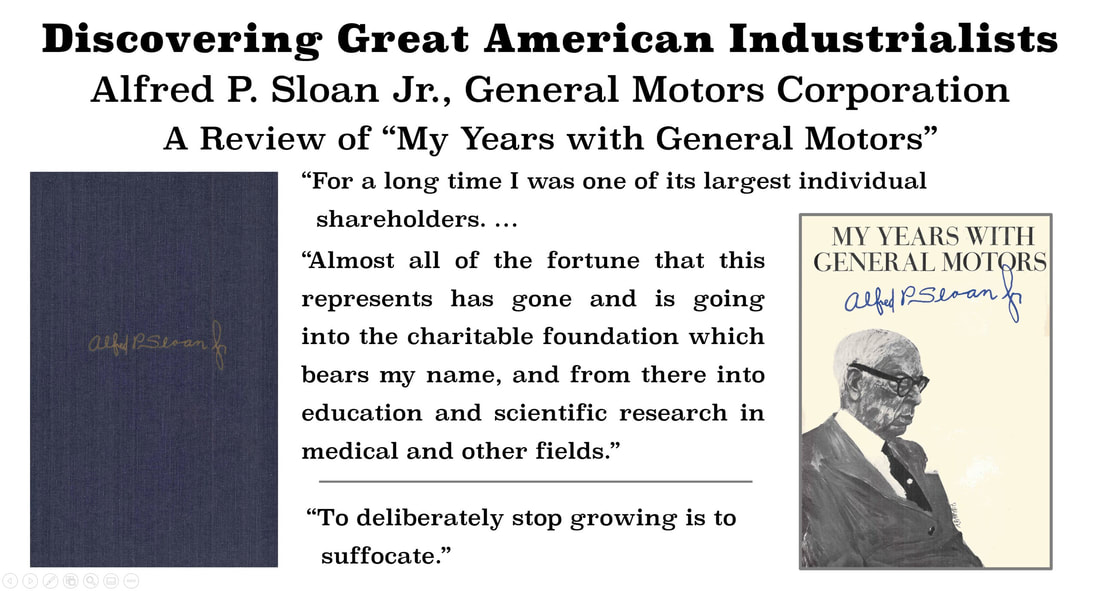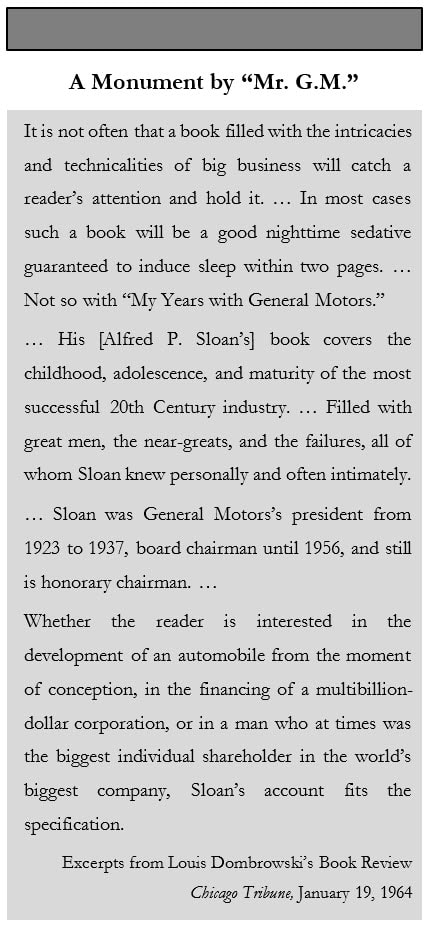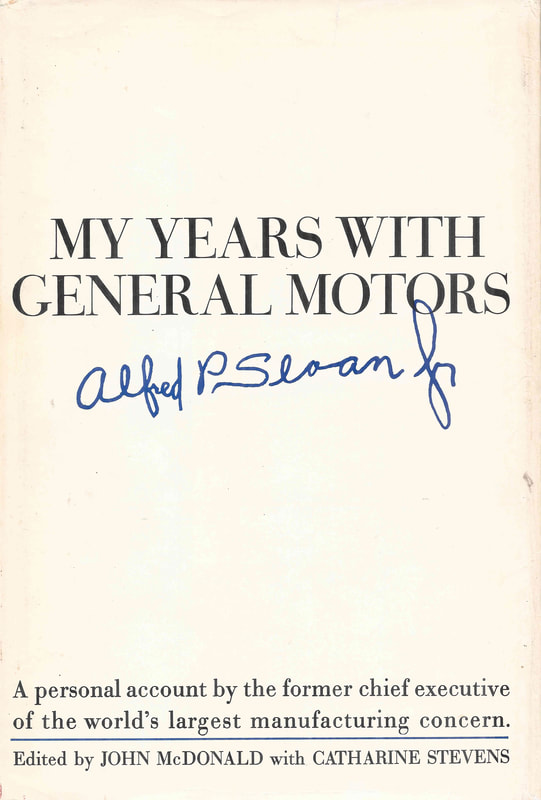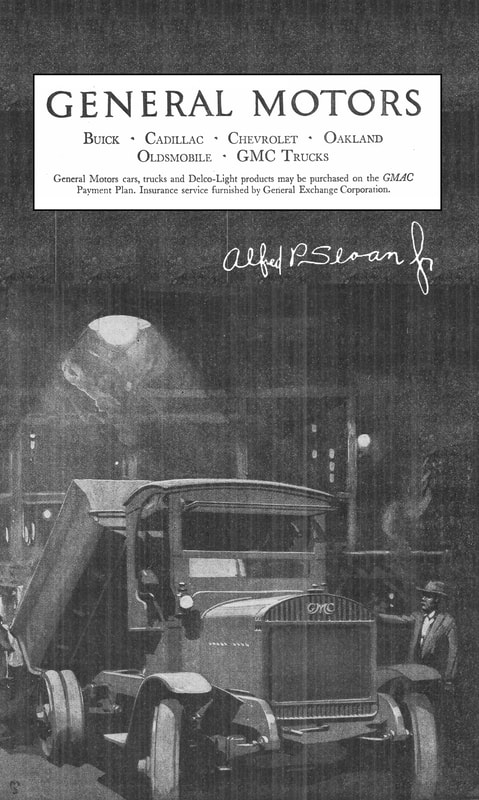A Review of "My Years with General Motors"
|
|
Date Published: June 23, 2021
Date Modified: June 30, 2024 |
This single paragraph summarizes the book and why a business leader should read it: the concept of coordinated decentralization.
"From decentralization we get initiative, responsibility, development of personnel, decisions close to the facts, flexibility – in short, all the qualities necessary for an organization to adapt to new conditions. From coordination we get efficiencies and economies. It must be apparent that coordinated decentralization is not an easy concept to apply. There is no hard and fast rule for sorting out the various responsibilities and the best way to assign them.
"The balance which is struck between corporate and divisional responsibility varies according to what is being decided, the circumstances of the time, past experience, and the temperaments and skills of the executives involved."
In fewer words which too many rule followers find so difficult to understand: "It just depends."
I like it!
"From decentralization we get initiative, responsibility, development of personnel, decisions close to the facts, flexibility – in short, all the qualities necessary for an organization to adapt to new conditions. From coordination we get efficiencies and economies. It must be apparent that coordinated decentralization is not an easy concept to apply. There is no hard and fast rule for sorting out the various responsibilities and the best way to assign them.
"The balance which is struck between corporate and divisional responsibility varies according to what is being decided, the circumstances of the time, past experience, and the temperaments and skills of the executives involved."
In fewer words which too many rule followers find so difficult to understand: "It just depends."
I like it!
A Review of "My Years with General Motors" by Alfred P. Sloan Jr.
- Reviews of the Day: 1964
- Selected Quotes from "My Years with General Motors"
- This Author’s Thoughts and Perceptions
Alfred P. Sloan Jr.: My Years with General Motors
Reviews of the Day: 1964
|
In 1964, Alfred P. Sloan’s My Years with General Motors made the country’s top five, non-fiction, best seller’s list and stayed there for most of the year. It was interesting to read the critiques of the book.
One review asked if it is okay to be critical of a book that omits so much: his personal life, his outside interests, his interactions with others outside of General Motors and the automotive industry, and his charitable interests because after all, “Almost all of the fortune that this [stock holdings] represents has gone and is going into the charitable foundation which bears my name, and from there into education and scientific research in medical and other fields.”
These were the areas I was most interested in as I have found that the paths of Alfred P. Sloan Jr. and Thomas J. Watson Sr. crossed a multitude of times in their careers: the International Trade Relations subcommittee of the Business Advisory Council to FDR, joint signatories of a letter to the President of Harvard University acknowledging the debt of business to American Universities, formation of Research Associates of MIT to help business and universities work closer together, and the “Share the Work Movement” during the Great Depression.
I was hoping to find a few nuggets concerning their interactions in these areas, but the book never strays – as the title suggests – outside of General Motors and the automotive industry and those relationships.
|
A Selected Quote of Alfred P. Sloan Jr.
|
That being said, I was impressed with the major theme of the book and found it very relevant in my research of the changes that are taking place at IBM in the 21st Century. One theme is driven home from Sloan’s introductory chapter to his second-to-last chapter entitled, “The Management: How it Works.”
In this chapter, Mr. Sloan writes, “It has been a thesis of this book that good management rests on a reconciliation of centralization and decentralization, or “decentralization with coordinated control.” I love it when an author scribes out so plainly the theme of his book. He also describes the benefits that accrued to his organization and his management team as they stayed the course on this policy. Sloan writes:
|
"From decentralization we get initiative, responsibility, development of personnel, decisions close to the facts, flexibility – in short, all the qualities necessary for an organization to adapt to new conditions. From coordination we get efficiencies and economies. It must be apparent that coordinated decentralization is not an easy concept to apply. There is no hard and fast rule for sorting out the various responsibilities and the best way to assign them.
"The balance which is struck between corporate and divisional responsibility varies according to what is being decided, the circumstances of the time, past experience, and the temperaments and skills of the executives involved."
"The balance which is struck between corporate and divisional responsibility varies according to what is being decided, the circumstances of the time, past experience, and the temperaments and skills of the executives involved."
This Author's Thoughts and Perceptions
|
This single paragraph summarizes the book and why a business leader should read it. It summarizes the profit that will be found in an organization and management team that is constantly balancing the benefits between centralization and decentralization. It was fascinating to read Alfred P. Sloan’s memorandums of the time struggling with this conflict. He was a true believer in the benefits of decentralization. Fundamentally his rule was: It depends! The business leader must be constantly flexible in their approach.
For example, he recounts gaining control of the company to survive the Recession of 1920-21. He walks the reader through the centralization they actively implemented to gain centralized control of the corporation’s inventory; but he then describes how the top management team implemented policies so they could let the control revert back to the individual divisions. He describes the formation of policy committees to delineate and formalize the lines between corporate centralization and divisional empowerment; and he covers how this model of decentralization of coordinated control was one of the major factors why General Motors remained in the black during the Great Depression, and how the organization was able to adapt so quickly to assist the nation’s struggle against fascism during World War II. |
As I read the changes Alfred P. Sloan implemented at General Motors highlighted above, I couldn’t help but think of Louis V. Gerstner’s centralization of control at IBM in 1993. It was probably a necessary action of the time to get the company financially back on its feet (just like General Motors in 1920), but Lou failed to decentralize after the recovery—in fact, he created IBM’s financial autocracy. The result is that IBM revenue and profit productivity flattened in 1995 and has been in a continual decline for the entire 21st Century. Rather than improved profits—earnings-per-share—coming from productivity improvements they have come from financial gamesmanship: workforce rebalancing, employee benefit cuts, and selling off once-critical assets—whole divisions.
Lou Gerstner’s, Sam Palmisano’s, Ginni Rometty’s and now Arvind Krishna's policies of over-centralization and ceding of business control to a financial autocracy has destroyed initiative, blurred responsibilities, failed to offer leadership growth opportunities to its personnel, removed decision making far from the customer where the facts reside, and is an inflexible organizational structure – in short, they have killed all the qualities necessary for an organization to adapt to new conditions. This is why IBM has been unsuccessful so far in the 21st Century in adapting to significant changes in the marketplace or “transform” as Ginni used to say.
For this reason, Alfred P. Sloan Jr.’s My Years with General Motors was a tremendous, supportive read. It was further evidence from one of America’s greatest industrialists that what I have been writing about IBM for the last eleven years has been on target:
Lou Gerstner’s, Sam Palmisano’s, Ginni Rometty’s and now Arvind Krishna's policies of over-centralization and ceding of business control to a financial autocracy has destroyed initiative, blurred responsibilities, failed to offer leadership growth opportunities to its personnel, removed decision making far from the customer where the facts reside, and is an inflexible organizational structure – in short, they have killed all the qualities necessary for an organization to adapt to new conditions. This is why IBM has been unsuccessful so far in the 21st Century in adapting to significant changes in the marketplace or “transform” as Ginni used to say.
For this reason, Alfred P. Sloan Jr.’s My Years with General Motors was a tremendous, supportive read. It was further evidence from one of America’s greatest industrialists that what I have been writing about IBM for the last eleven years has been on target:
IBM must let go of its centralizing, financial autocracy: THINK, Act and Let Go.



